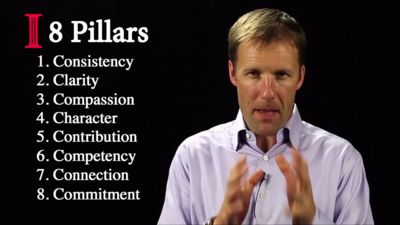Trust: The Silver Bullet?
Written by Anthony Demangone
Certain things in life help make things easier. Trust is certainly one of those things.
We have share insurance on our accounts. Consumers can trust us when we say their money is safe.
Regulation E protects consumers. They can trust that using their debit card is safe.Â
Your child is going to a sleepover. You know and trust the family that is hosting the party. You'll sleep a little bit better that night.
Warranties. Money-back guarantees. All of these things make people feel safe. They can trust that they won't be hurt.Â
But how does that translate into businesses? Or people?
I'm lucky to have met someone who has studied the link between trust and individual and organizational success. His name is David Horsager.Â
He's studied trust, and he has found eight pillars that support trust. Once those pillars are in place, the effects are amazing. People are more likely to follow those that they trust. Consumers do more business with those that they trust.
Trust, it seems, creates a safe path for people. Go here and do this, and you won't be harmed. And because people don't have "money back guarantees, we have to build trust using the eight pillars.
Here are the pillars, in David's own words.Â
- Consistency: The little things done consistently make for leaders being followed, increased sales and retention, and a higher level of trust. Consistency is the way brands are built and character is revealed.
- Clarity: People trust the clear and mistrust or distrust the ambiguous. Be clear about your mission, purpose, expectations, and daily activities. When people are clear about the mission they do the little things differently. A clear mission unifies and inspires. When we are clear about priorities on a daily basis we become productive and effective.
- Compassion: Think beyond yourself. Never underestimate the power of sincerely caring. It is the reason we trust our mothers over some salespeople. We are skeptical if the salesperson really has our best interest in mind. âÂÂDo unto others as you would have them do unto youâ is not just an old saying; it is a bottom-line truth. If followed, it builds trust.
- Character: Do what is right over what is easy. Character is a mix of two things. One is integrity, which means being the same from beliefs to words to actions. The other is moral character. Take the high road in every interaction.
- Contribution: Few things build trust quicker than actual results. Be a contributor who delivers real results.
- Competency: Staying fresh, relevant and capable builds trust. The humble teachable person keeps learning new and better ways of doing things. They stay current on ideas and trends. There is always more to learn so make a habit of reading, learning, and listening to fresh information.
- Connection: People want to follow, buy from, and be around friends. People become friends when they build connections. Ask questions. Listen. Life, work,and trust are about relationships. All relationships are best built by establishing genuine connection.
- Commitment: Stick with it through adversity. Followers trusted General Patton; Martin Luther King, Jr.; Gandhi; and George Washington because they saw commitment. They saw sacrifice for the greater good. Commitment reveals and builds trust.
Looking at that list, how do you measure up? Which pillars do you already have? Which need work?
We're fortunate to have David be our keynote speaker at NAFCU's annual conference in Nashville, Tennessee. Already, 900 people from 300 different organizations are coming to hear his timely and important message about trust. I hope to see you there.
For more details about the conference, please visit our website.Â

